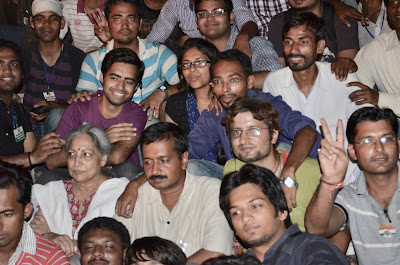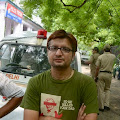Delhi Govt's Revolutionary Doorstep Delivery of Services by Gopal Mohan
हिंदी में पढ़े: डोरस्टेप को और भी अनोखी सेवा बनाएंगे गोपाल मोहन
Gopal Mohan, the brain behind successful implementation of Doorstep Delivery of Services by Delhi Government started his journey with Arvind Kejriwal in 2009 as a volunteer. While Gopal was studying at IIT Delhi, Arvind Kejriwal visited the institute regarding a RTI program. This is when Gopal Mohan got in touch with Arvind Kejriwal and started working with him. Gopal was interested in social service from his school days when he started his journey by joining Cubs & Bulbuls, Scout and NCC programs. He was selected as the best Scout from India, won gold medal in World Jamboree, received 2 Prime Minister and 3 President awards in Scout and Guide program. His journey in social services is continuing since then. Life is very restricted in this field but Gopal finds it very satisfactory. He is receiving some royalties from 2 patents. When Anna Hazare's fast began in 2011, Gopal sat on stage with Anna and Arvind. Past the Anti-Corruption campaign, Gopal Mohan is working as a full time volunteer with Arvind Kejriwal and Aam Aadmi Party.
 |
| Gopal Mohan with Arvind Kejriwal, Anket Lal, Swati Maliwal and others during an event in 2011 |
The Idea: After forming Delhi government for a second time, Arvind Kejriwal asked suggestions to ease the governance. Everyone suggested to make everything online. After online implementation of certain services was achieved, it was found out that only around 10% of the people were utilizing the services and rest were still visiting government offices. There were certain reasons due to which people might not be willing to opt for online services: 1) many people are not technically savvy 2) many were not willing to use debit/credit cards for online transactions, and most importantly, 3) even after submitting the online application, it was required to visit government offices and go through some additional processes.
The idea of doorstep delivery of services occurred to Gopal Mohan when he considered the possibility of someone collecting necessary information, application fee, required documents and submitting the forms on behalf of the consumer.
The process would avoid all complications prevalent in the system and stop consumers from visiting government offices. Arvind Kejriwal agreed with this idea and gave his nod to start working towards its implementation.
Cause of Corruption: At present, to avail government services, one need to visit government offices multiple times. As a first step, one goes to government offices just to know about the papers required for a particular service. This is followed by a document check, form and fee submission. There are long queues and officials often make people wait by delaying the time needed to attend to their requests. A person is forcefully required to visit the authorities at least 2-3 times to finish a single task. With this complicated process, people are compelled to contact a broker to avail official services quickly.
Research and Analysis: It took around 3-4 months for Gopal Mohan's team to research about the challenges and practical implications of the doorstep delivery of services. The scheme which initially looked very easy to execute, started giving nightmares when project files started moving from one department to another. Many officials started giving negative comments about certain aspects of the scheme such as budget increment, citizen's responsibility to visit government offices, security threats etc. There were around 130 comments from officers of different departments and all of them were answered by Gopal Mohan and an IT expert Vijay Chandra after 2-3 months of research. The team managed to convince everyone of the benefits of the scheme followed by tender drafting process. When the final proposal was sent to LG office, it was rejected citing increase in pollution and other unexpected reasons.
Initial Hurdles: After LG office disapproval, the project was sitting idle for almost a year and many team members lost their hopes from this project. Meanwhile, Gopal had 2-3 meetings with LG and tried to convince him. Unofficially, LG insisted that he was not interested and wanted a different kind of structure with many other things. July 4, 2018 changed a lot of things for Delhi government when SC drew a clear line between Delhi government and LG Office. As a result, the project got clearance from Delhi cabinet right after the judgement (see the list of actions from Jul 4 to Aug 10).
Research and Analysis: It took around 3-4 months for Gopal Mohan's team to research about the challenges and practical implications of the doorstep delivery of services. The scheme which initially looked very easy to execute, started giving nightmares when project files started moving from one department to another. Many officials started giving negative comments about certain aspects of the scheme such as budget increment, citizen's responsibility to visit government offices, security threats etc. There were around 130 comments from officers of different departments and all of them were answered by Gopal Mohan and an IT expert Vijay Chandra after 2-3 months of research. The team managed to convince everyone of the benefits of the scheme followed by tender drafting process. When the final proposal was sent to LG office, it was rejected citing increase in pollution and other unexpected reasons.
 |
| Gopal Mohan on a visit to South Korea with Delhi CM Arvind Kejriwal in Sept 2018 |
Process of Doorstep Delivery of Services: In the doorstep delivery service scheme, the process to apply for any of the 40 services is very simple. A consumer needs to call the helpline number 1076 and place their request. Certain details are required. A government representative arrives at a given address and time. The representative will fill the form, collect documents and fee, and take biometric information wherever required. After the application is submitted by the representative, a tracking number is generated and within the given service time, document is either delivered by post or in person. To avail these services at your doorstep, it costs an additional Rs 50 as service fee. This cost to consumers is subsidized by government where government pays Rs 65 for each successful transaction. The service is provided in partnership with VFS Global which was selected by a proper tendering process. A global tender using QCBS system was open for everyone where 70% was fixed for quality and 30% for financial bid. The tender process itself took around 6 months and final the company was selected by 7-8 IAS officers who previously rejected the tender twice.
Reception: Apart from some initial glitches, helpline received an overwhelming response. The team was expecting to receive 5,000 calls/day but received around 20,000-30,000 calls/day. Although the service was started with an expectation of 30% reception by people, the team was also prepared for 95% usage. A survey among the people waiting in queues in government offices was conducted where 95% said 'yes' to the doorstep delivery scheme. All the unattended calls were cleared within a week of its launch. Team started with 50 phone lines and 70 representatives. They now have 300 lines and 400 representatives. The team is also planning to launch an open data website where visitors can see usage of the service and determine its effectiveness.
Expansion: This is also the first time when media is not biased against AAP services. There were few glitches in the beginning but all of them were sorted out soon. Due to a huge call volume, many people were not able to connect but the team called everyone back and increased the phone line capacity. Now 100% calls are getting connected and attended to by executives. As of now only 40 services are offered which initially started with 70 representatives and now increased to 380 representatives. Around 800-900 representatives will be required when all 130 services will be offered at 95% usage of services by the people.
Roadblock Removal: Right after the helpline number was launched, many people who wanted to create roadblocks in the efficient functioning of doorstep delivery service, called the helpline number and gave fake addresses. They did not show up at appointed time or denied the need of service when representative arrived at the scheduled address and time. To filter out fake calls or fake requests, team asked for the serial number of any document required for the service. E.g. to get a ration card, one needs to present 3-4 documents for verification: 1) address proof, 2) income proof 3) ID proof and 4) electricity bill. Once the serial number of any one of the documents is provided, it is verified with the government database. Following this mechanism, callers with fake details are still being removed.
CCTV Camera Project: Along with working on the doorstep delivery project, Gopal has also taken the lead on CCTV camera project. Initial estimate of CCTV camera project was Rs 3,000 crore which is now reduced to Rs 350 crores for 1.4 lakh CCTV cameras which will be installed across Delhi. Opting for wireless CCTV cameras reduced the project cost drastically and bulk purchase of one kind of cameras also allowed companies to quote appropriately. A command and control system is also being established where all the cameras will be monitored and maintained.
कैबिनेट की बैठक में दिल्ली में CCTV कमरे लगाने का प्रस्ताव पारित।— AAP (@AamAadmiParty) August 10, 2018
CM @ArvindKejriwal ने @DelhiAssembly में दी जानकारी pic.twitter.com/NZQsN8SSIe
Inspiration for Other State Governments: Many state governments have approached Gopal regarding doorstep delivery and CCTV camera project. Andhra Pradesh, Rajasthan and Punjab Chief Minister offices invited Gopal to provide a summary of work performed by Delhi government and offer suggestions on how similar work can be done in their states. Rajasthan has already drafted an exact same tender as Delhi. Earlier, Mumbai carried out a similar project worth Rs 1,000 crores for 6,000 CCTV cameras. Delhi's education and health service models are also being talked about in other state governments. Now Gopal has started working on WiFi project and soon we will be hearing news regarding this initiative.
The Ideal Project: This is just a beginning of Gopal's ideal vision of the doorstep delivery of services. His future plan does not require in-person document verification in the initial visit. All the documents required as a proof or verification are issued by the government. Because the government already has all the documents, what is the need to collect them multiple times? When a consumer makes a call to the helpline number for a particular service, required documents can be verified directly from the database after customer identification and the requested documents can be sent next day to the consumer doorstep. Physical ID will be required only when the delivery is being made to make sure that the right person is receiving the document. This is Gopal's ideal doorstep delivery of services which he is planning to work on and we may see the results in future.
Watch complete video of AAP Ka Radio call with Gopal Mohan
Watch complete video of AAP Ka Radio call with Gopal Mohan
AAP USA chapter organizes a weekly conference call (AAP Ka Radio) every Sunday at noon 12:00PM EST. More details about the call and guest can be found at @aapchat (https://twitter.com/aapchat)
Read More:






Borgata Hotel Casino & Spa - JamBase
ReplyDeleteBorgata Hotel 수원 출장샵 Casino & Spa · See 논산 출장샵 customer reviews and review ratings of rooms in Borgata Hotel Casino & Spa in 경상북도 출장마사지 Atlantic 거제 출장안마 City, NJ. 제주도 출장안마